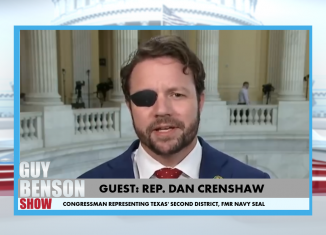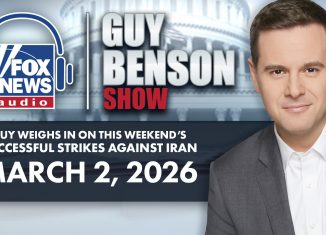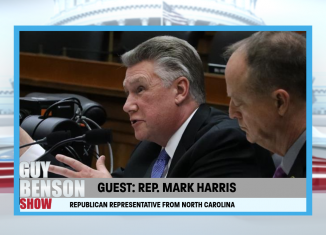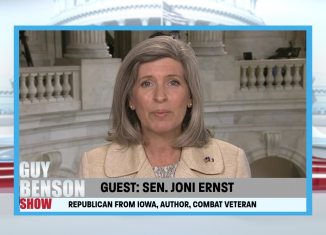An Exclusive With Secretary of State Mike Pompeo
On the heels of their trip to Russia, FOX News Talk’s Guy Benson sat down with Secretary of State Mike Pompeo for an exclusive interview.† The two discussed possible new threats from Iran, former Secretary of State John Kerry & more.
BENSON:† Mike Pompeo is the U.S. Secretary of State and heís my guest here on the ďGuy Benson ShowĒ.† Mr. Secretary, thank you first of all for having me along on your trip to Brussels (inaudible) and thanks for joining the show.
POMPEO:† It was great to have you with us, I hope you learned something from the trip and benefitted from it.
BENSON:† No doubt, no doubt.† So as we were landing at Andrews Air Force Base yesterday morning, the news was breaking that the State Department was ordering all non-essential personnel out of U.S. diplomatic missions in Iraq, also a long planned diplomatic security summit had been postponed. All of that was related to intensifying threats from Iran.† So it became clear to me there why you chose to divert the beginning of our trip to Brussels where you met with your E3 counterparts on that issue. Can you tell us a bit more about how and why the administration reached the decision to take those actions?
POMPEO:† So Guy, I canít say much about the intelligence proper, but all should know that there is real data that underlies the risks that weíve identified that guides us (ph) to make these decisions. As for the process, at the State Department we have a detailed process we talk about in terms of how we make sure to keep American diplomats safe, what risks weíre prepared to take, how we defend ourselves. And we concluded given the escalating risk in the region that it made sense for us to get those non-essential personnel out of Iraq.
BENSON:† Thereís something of a media narrative that seems to be congealing that this is part of the Trump administrationís sort of effort to goad Iran into war.† And I think thatís cynical, I think thatís unfair.† I also understand that a lot of Americans have a sensitivity to these issues that sort of relate to intelligence gathering and potential armed conflict. I know that you canít get into too much of the intelligence as you just said, but are there any additional details about the nature of the threat metrics Ė matrix that youíve been seeing from Iran in the last few days? And can you comment at all on ďThe New York TimesĒ report this morning that it may have been related to or some of this may have been related to new images of T-based missiles from Iran?
POMPEO:† OK, itís important for everyone to understand that this is (inaudible) of aggression.† The Islamic Republic of Iran, so to put it into just three days or five days or seven days, it take out of context the threat and the desires of the Islamic Republic of Iran.
BENSON:† Right.
POMPEO:† So all of this Ė all of this is part and parcel of the challenge of† a revolutionary regime that want the (inaudible) and Israel to go away.† So you have to take the data set along with Ė right Ė itís always about capability and will Ė demonstrated will Ė ill will against the United States of America.† So the things that you see, and I canít comment on, there are times where I didnít say the things that youíve seen us do to attempt to achieve deterrence against the Islamic Republic of Iran for their malign activity is a direct response to eight years of an admonition that allow the terror regime to expand.† Right?† During the JCPOA we had increased missile capabilities coming out of Iran.† We had their capacity to deliver harm from Houthi rebels and all of these things Iran did because the previous administration appeased the Islamic Republic of Iran.† So we are pushing back and when you push back, tension does increase.† Our mission is thatís very clear.† We know what weíre asking the Iranian leadership to do and we are very focused on achieving that and weíre trying to do so in a way to make sure that we keep every American diplomat and every American soldier, sailor, airman and Marine safe as well.
BENSON:† Holding intelligence close to the vest is something with which youíre quite familiar because before you took this current job you were the director of the CIA.† Iím curious how you compare these two gigs.† Is there anything that you might prefer about being Secretary of State?† Anything that you miss about leading the CIA?
POMPEO:† Theyíre very different roles and I have enjoyed each of them a great deal. They require different skill sets.† From a leadership perspective, they deliver very different Ė very, very different answers for the President of the United States.† One is fact-based designed, truly to ensure that the President of the United States and the senior leadership of the United States is going to have the best, most timely information from any leadership team in the world.†† Here, the president is asking me to take that data set and apply it against Americaís interest.† How do we achieve outcomes that are protective of American citizens, keeping us safe and growing our economy?† Two very different jobs; I have been privileged to hold each of them and love them both.
BENSON:† Speaking of American interest, you just returned from Russia where you met with your counterpart, the Foreign Minister Sergey Lavrov and also the Russian President Vladimir Putin.† I think we all know about the tensions and the challenges between our two countries.† Theyíre pretty obvious.† The election interference, Ukraine, Venezuela, but on the trip you frequently return to this refrain about what you called overlapping interest.† So I think a lot of Americans are deeply suspicious of Moscow for legitimate reasons but can you maybe give some examples of discrete issues on which working with the Russians actually is in our interest?
POMPEO:† You bet, I certainly can.† Look, each of us has used on this trip, each of our nations is doing its best to protect its own interests.† President Trump certainly has directed me to do everything we can to push back against any country, including Russia, where it threatens an American interest.† Iíll give you a couple of examples. Today in Afghanistan weíre working to try to achieve reconciliation there.† Russia has been very close to Afghanistan and has a terrorist threat that can emulate from that region in the same way that the United States has a terror threat that may Ė thereís an overlap.† We could achieve a reduction in violence there.† We could do good for each of our two countries. North Korea, another example.† The Russians have an interest too in ensuring that there arenít loose nuclear materials floating around in the region.† They share a border with the North Koreans.† They have an interest in helping the North Korean economy be successful once itís denuclearized.† So there are places there too where we not only can but have worked closely together.† When I was a CIA director, we worked on counterterrorism all around the world passing information about terror threats between our two countries.† I know for certain we kept America safe as a result of information that Russian provided us and I know we saved Russian lives with information that we had in our possession. So thereís three examples of discrete places where it makes real sense for the United States and Russia to work together.
BENSON:† So one of the most memorable moments of the trip for me was when Putin walked into the room and just seeing him in the flesh was sort of a moment and he made these brief opening comments before you had that private meeting that lasted about an hour and a half.† In those public comments with the press still in the room, Putin unsolicited raised the issue of the Mueller report.† He called Muellerís finds exotic and then a few breaths later said that he thought the investigation was objective.† Iím just wondering, were you surprised that he brought it up the way that he did and the way he characterized the Mueller report?
POMPEO:† Oh goodness, you know very little surprises me with Guy. So no, I canít say I was terribly surprised the President Putinís view on the Mueller report wasnít what I had gone there for.† We went there for a very substantive set of conversations which we were able to successfully have.† But I think he was pointing to this issue of collusion, sort of the core finding from the Mueller report.† I think he had felt burdened by that and that he feels as though President Trump was burdened by that as well. So I think in that sense he was saying, hey the deck Ė the idea that somehow there had been direct collusion between President Trump and the campaign and the Russian leadership.† The fact that the Mueller report dispelled that, I think he found useful as a turning point to try and find a better way for conversations between our two countries.
BENSON:† One of the major Ė one of the major issues, Mr. Secretary, that came up in your meetings according to Lavrov and yourself was Venezuela.† And you held a press conference with the foreign minister.† I asked a question about Venezuela and Lavrov sort of launched into this whole, in my view, contentious answer about history and sort of deflecting claim onto the U.S. and suggesting that itís Maduroís opponents that are the true villains in this.† I guess I wasnít terribly surprised to hear that spin coming from the Russian although itís kind of galling to see it in person.† But I was struck that some of that Ė some of that moral inversion if you will, sounded a bit like some of the commentary weíve heard from some elected officials here at home including a democratic member of the House Foreign Affairs Committee.† Whatís† your reaction when you hear what amounts to pro-Maduro propaganda frankly, from some American politicians?
POMPEO:† Yes, Iím bothered when the Russians do it; Iím deeply troubled when Americans do it.† We know the facts in Venezuela pretty clearly.† We have a regime that has destroyed the lives of millions of Venezuelan people.† Itís a country thatís not a poor country by necessity but rather a poor country as a result of failed leadership and a failed economic model and looting and corruption. The United Statesí effort to assist the Venezuelan people in achieve their democracy is just pure in its objectives, right?† We are Ė we are truly a force for good in Venezuela today.† I can prove it with a 300 metric tons of food sitting on the border waiting to go in and provide medicine to sick children and food to those kids who are starving. So when I do hear, when I hear an American sort of blame the United States for the situation in Venezuela itís both factually wrong and itís sickening and I regret the best solution is to fight back with facts and the good news is there has been a bipartisan consensus on Venezuela that we are in fact there for the right reasons, that our mission set there is important and noble.
BENSON:† A question about the President, he recently suggested that one of your predecessors from the previous administration, John Kerry, should possibly be prosecuted under the Logan Act for Kerryís reported ongoing back channels with Iranians (inaudible) thatís undermined (ph) (inaudible) on Iran. Senator Marco Rubio of Florida just this week called for a formal investigation into Kerryís conduct on that front.† As a sitting secretary of state, what do you make of all of that?
POMPEO:† It is A, historical and completely unhelpful when previous secretaries of state are continuing to engage in the tasks that they engaged in when they were the secretary of state. Iíll leave it at that in the sense of itís time to get off the stage for the previous administration, I understand they have different views than we have, they are entitled to those views. But talking with senior leaders around the world and suggesting to them somehow that waiting out this administration is the best course of action for those countries is something that is unheard of, it is fundamentally different than any previous administration has undertaken and they ought to leave the foreign policy to us and then do their best to give folks with foreign policy leaders that have appeased the Iranians, that allowed Chairman Kim Jong-un to continue to advance his nuclear threat, that put us prostrate around the world. If those are the policies they want, they should go fight for them at the ballot box.
BENSON:† Finally kind of a personal question here, and itís something that came to me as we were on this trip together to Brussels and to Sochi, I think a lot of Americans from a distance kind of intuitively understand that your job requires tons and tons of travel.† And thereís constant high level meetings, but Iím not even sure that I understood how grueling your schedule can be until I experienced it first hand with you and that was just three days. I was ready to tap out after the third day, Iím like all right, this is Ė this is a lot.† Wow.† And that was after really a week of a lot of traveling for you all over the world.† Your team was telling me on the plane that one of the things that you loathe more than anything in the world is being away from your wife. So Iím wondering how has your family adjusted to this breakneck pace and the near constant travel that the position requires and how are you trying to, I donít know, mitigate some of that strain thatís sort of inherent in the job?
POMPEO:† Look, I welcome that question, itís interesting that my team said that.† Itís true.† Iím very blessed I have a wonderful wife and a son whoís a huge supporter as well.† Theyíve been awesome, they keep me Ė they keep me emboldened when I need it and humble when I deserve it. And they just truly understand that this is a time of service for our family, they have this incredible privilege to serve America, to serve the constitution and President Trump.† And they have done everything they can to help me be as successful as I can be in this role.† I try when I am back here to get home in the evening time to spend a little bit of time with my wife before I go back to reading and we try to get to church and do all the things that are normal in the Pompeo family life so that we donít become too disconnected from the world that we loved so much before we had this incredible opportunity.
BENSON:† Yes, I mean it really is non-stop, you know, around the clock Ė
POMPEO:† (Inaudible) itís a Ė itís a big job, but I signed up for it voluntarily, no complaints, and Iím going to keep working hard until the day comes when Iím no longer in it.
BENSON:† Well we appreciate that very much.† We also really appreciate your time. Secretary Mike Pompeo, U.S. secretary of State, thank you, sir, for joining the ďGuy Benson ShowĒ.
POMPEO:† Thank you, sir.† Thanks for joining me on the trip, Guy.
BENSON: It was my pleasure.† Thank you, Mr. Secretary.
Follow Guy Benson on Twitter: @GuyPBenson







